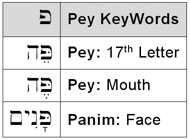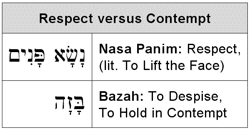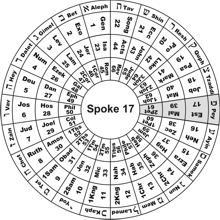Malachi: My Messenger
The law of truth was in his mouth (pey), and iniquity was not found in his lips:
he walked with me in peace and equity, and did turn many away from iniquity. For the priest's lips should keep
knowledge, and they should seek the law at his mouth (pey):
for he is the messenger (malak) of the LORD of hosts.
Malachi 2:6f (Spoke 17, Cycle 2)
 The
Book of Malachi is one of the books in which its name coincides with an essential aspect of its
character. We saw this in the case of Micah on Spoke 11 whose name means
"Who is like the Lord?" and here, of course, on Spoke 17 with Esther whose name means
"I will hide (my face)". The name Malachi is formed from malak (angel/messenger)
(used in the verse above) with the Yod suffix to indicate the first person possessive, the idea of "me" or "mine".
Thus, Malachi means "my messenger." This word appears twice in Malachi, once as the name of the prophet in the opening verse, and
once in the most famous passage of the book: The
Book of Malachi is one of the books in which its name coincides with an essential aspect of its
character. We saw this in the case of Micah on Spoke 11 whose name means
"Who is like the Lord?" and here, of course, on Spoke 17 with Esther whose name means
"I will hide (my face)". The name Malachi is formed from malak (angel/messenger)
(used in the verse above) with the Yod suffix to indicate the first person possessive, the idea of "me" or "mine".
Thus, Malachi means "my messenger." This word appears twice in Malachi, once as the name of the prophet in the opening verse, and
once in the most famous passage of the book:
Behold, I will send my messenger (malachi), and he shall prepare (panah) the way before me:
and the Lord, whom ye seek, shall suddenly (pithom) come to his temple, even the messenger (malak)
of the covenant, whom ye delight in: behold, he shall come, saith the LORD of hosts.
Malachi 3:1 (Spoke 17, Cycle 2)
This verse is profoundly integrated with the meaning of the 17th letter, as discussed in
Parousia, the Coming of the Lord. Likewise, the verse quoted at the head of this page
contains two occurrences of the name of 17th letter, pey (mouth) in conjunction
with the name of the book, malachi (my messenger). The real miracle here is what the relation between
pey (mouth) and God's messenger (malachi) is made explicit in the text itself, saying "the law at his mouth (pey):
for he is the messenger (malak) of the LORD of hosts." This is typical of the whole book. It reveals the
supernatural integration of the content of Malachi with its position on the Wheel.
Respect or Contempt for the Face of God?
A son honoureth his father, and a servant his master:
if then I be a father, where is mine honour? and if I be a master, where is my fear? saith the LORD of hosts
unto you, O priests, that despise (bazah) my name. And ye say, Wherein have we despised (bazah)
thy name? Ye offer polluted bread upon mine altar; and ye say, Wherein have we polluted thee?
In that ye say, The table of the LORD is contemptible (bazah). And if ye offer the blind
for sacrifice, is it not evil? and if ye offer the lame and sick, is it not evil?
offer it now unto thy governor; will he be pleased with thee, or accept thy person (nasa panim)? saith
the LORD of hosts. And now, I pray you, beseech God that he will be gracious unto us: this hath been
by your means: will he regard your persons (nasa panim)? saith the LORD of hosts.
Malachi 1:6ff (Spoke 17, Cycle 2)
 The
Book of Malachi opens with two occurrences of the phrase nasa panim, which literally means
"to lift the face" and is sometimes used that way.
But it is also a Hebrew idiom meaning to accept, respect, or honor
a person or a thing, which is how God used it twice in the passage above. If the respect is biased or
prejudiced, the same phrase means "to show partiality." God used it this way in the second chapter of Malachi
where He continued his condemnation of the corrupt priests: The
Book of Malachi opens with two occurrences of the phrase nasa panim, which literally means
"to lift the face" and is sometimes used that way.
But it is also a Hebrew idiom meaning to accept, respect, or honor
a person or a thing, which is how God used it twice in the passage above. If the respect is biased or
prejudiced, the same phrase means "to show partiality." God used it this way in the second chapter of Malachi
where He continued his condemnation of the corrupt priests:
But ye are departed out of the way; ye have caused many to stumble at the law;
ye have corrupted the covenant of Levi,
saith the LORD of hosts. Therefore have I also made you contemptible (bazah) and base before all the people,
according as ye have not kept my ways, but have been partial (nasa panim) in the law.
Malachi 2:8f (Spoke 17, Cycle 2)
God also used this idiom in one of His Alphabetic Verses corresponding to Pey:
- AV Lam 4:16 The face (panim) of the Lord hath divided them; he will no more regard them:
they respected not the persons of the priests (p'nei kohanim lo nasu), they favoured not the elders.
This verse shows the use of panim as a metonym for a person, a word that came to
English from the Greek prosopon (face) via the Latin persona (mask).
Opposite the idea of respect is bazah, which means to despise, disdain,
scorn, and hold in contempt. God used this word five times in context with
the three occurrences of "nasa panim" in Malachi. This word was also used twice to describe
the threat of Vashti's disrespect for the king's command in Esther on Cycle 1 of Spoke 17:
For this deed of the queen shall come abroad unto all women, so that they shall
despise (bazah) their husbands in their eyes, when it shall be reported,
The king Ahasuerus commanded Vashti the queen to be brought in before him (l'panav), but
she came not. Likewise shall the ladies of Persia and Media say this day unto all the kingís princes,
which have heard of the deed of the queen. Thus shall there arise too much contempt (bazah) and wrath.
Esther 1:17ff (Spoke 17, Cycle 1)
The primary issue of respect versus contempt is the same in Esther and Malachi, with the themes in
both based on the fundamental Pey KeyWord panim (face), and with the contempt in both
expressed with the word bazah. This is a strong alphabetic and thematic correlation.
God severely sharpened His message in the second chapter of Malachi, which
He aimed directly at the corrupt priests:
And now, O ye priests, this commandment is for you. If ye will not hear,
and if ye will not lay it to heart, to give glory unto my name, saith the LORD of hosts, I
will even send a curse upon you, and I will curse your blessings: yea, I have cursed them
already, because ye do not lay it to heart. Behold, I will corrupt your seed,
and spread dung upon your faces (panim), even the dung of your solemn feasts;
and one shall take you away with it. And ye shall know that I have sent this commandment unto
you, that my covenant might be with Levi, saith the LORD of hosts.
My covenant was with him of life and peace; and I gave them to him for the fear wherewith he
feared me, and was afraid before my name. The law of truth was in his mouth (pey),
and iniquity was not found in his lips: he walked with me in peace and equity, and did turn
many away from iniquity. For the priestís lips should keep knowledge, and they should seek the
law at his mouth (pey): for he is the messenger (malakh) of
the LORD of hosts. But ye are departed out of the way; ye have caused many to stumble at
the law; ye have corrupted the covenant of Levi, saith the LORD of hosts. Therefore have I also
made you contemptible and base before (liphnei) all the people, according as
ye have not kept my ways, but have been partial (nasa panim) in the law.
Malachi 2:1ff (Spoke 17, Cycle 2)
This passage contains two instances of pey (mouth), two instances of panim (face)
one instance of liphnei (before), and multiple references to the disdain (bazah)
towards God that brought down His heavy condemnation. Could the coherence of this message with the meaning of
the seventeenth letter be any clearer? The answer is, of course, a resounding "Yes!" for there is no
end to the glory of God's Wisdom, as we shall presently see.
The Face of God and the Bread of the Presence
And now, appease, I pray thee, the face of God (p'nei El), And He doth favour us;
From your own hand hath this been, Doth He accept of you appearances? Said Jehovah of Hosts.
Malachi 1:9, YLT (Spoke 17, Cycle 2)
 It
is simply impossible to overstate the wonder evoked by God's design of the Bible Wheel. The verse above is
from Young's Literal Translation. It is one of the very few versions that does not glide over the
underlying Hebrew of this verse, which contains the one and only instance of the phrase P'nei El (Face of God)
outside of Genesis 32:30 where Jacob coined the name Peniel, saying "for I have seen God face to face" (panim el panim)."
Exactly how did this phrase "just happen" to appear here on Spoke 17, in the midst of a host of themes centered on
the meaning of Pey? Mere coincidence? Blind happenstance? It
is simply impossible to overstate the wonder evoked by God's design of the Bible Wheel. The verse above is
from Young's Literal Translation. It is one of the very few versions that does not glide over the
underlying Hebrew of this verse, which contains the one and only instance of the phrase P'nei El (Face of God)
outside of Genesis 32:30 where Jacob coined the name Peniel, saying "for I have seen God face to face" (panim el panim)."
Exactly how did this phrase "just happen" to appear here on Spoke 17, in the midst of a host of themes centered on
the meaning of Pey? Mere coincidence? Blind happenstance?
Yet there is still more. God's complaint began with His accusation that the corrupt priests
were offering "polluted bread" upon His altar:
... And ye say, Wherein have we despised (bazah) thy name? Ye offer polluted bread
upon mine altar; and ye say, Wherein have we polluted thee? In that ye say, The table of the LORD
is contemptible (bazah).
Malachi 1:6f (Spoke 17, Cycle 2)
The bread is called Shewbread in the KJV and the Bread of the Presence in modern
versions such as the NASB and NIV. Literally, it is the Bread of the Face (Lechem Panim) that was
supposed to be set continually before the Lord:
And thou shalt take fine flour, and bake twelve cakes [representing the twelve tribes] thereof:
two tenth deals shall be in one cake. And thou shalt set them in two rows, six on a row, upon the
pure table before the LORD (liphnei YHVH). And thou shalt put pure frankincense upon
each row, that it may be on the bread for a memorial, even an offering made by fire unto the LORD.
Every sabbath he shall set it in order before the LORD (liphnei YHVH) continually,
being taken from the children of Israel by an everlasting covenant. And it shall be Aaronís and
his sonsí; and they shall eat it in the holy place: for it is most holy unto him of the offerings of
the LORD made by fire by a perpetual statute.
Leviticus 24:5ff
In general, the role of God's Priests was to present offerings before the Lord,
to make atonement before the Lord, to bear the names of all Israel before the Lord.
The Table of the Lord was supposed to be pure and holy. When the apostate priests offered the "polluted bread" upon
God's altar, they were actually spitting in His Face. The fact that God gave these wicked
priests space to repent shows how great His mercy truly is. (See Before the King to understand the integration with
"before the Lord").
No Respect for God or His Priests (Alphabetic KeyLink)
The face of the Lord hath divided them; he will no more regard them:
they respected (nasa) not the persons (panim) of the priests,
they favoured (chanan) not the elders.
AV Lamentations 4:16 (Pey)
And now, I pray you, beseech the face of God that he will be gracious (chanan) unto us: this hath
been by your means: will he regard your persons? saith the LORD of hosts.
Malach 1:9 (Spoke 17, Cycle 2)
The most astounding aspect of the Bible Wheel is the correlation between the Alphabetic Verses and the books on the
corresponding Spokes. A simple reading the Pey verse of AV Lamentations immediately evokes a sense of the primary "flavor"
of Malachi. Yet even more astounding is the fact that the exact words used in the Alphabetic Verse are found in only
three passages of the Bible; the two verses quoted above and one from Deuteronomy 28:50. These verses are selected by
searching for the Strongs numbers in set (6440, 5375, 2603) which corresponds to the words
nasa, panim, and chanan.
Thus, there is a very strong thematic link between the Alphabetic Verse and Malachi on Spoke 17. This link becomes a true
KeyLink if we further constrain the search to include the name of the Lord (YHVH). Alternately, we could simply
search for all verses containing nasa, panim, chanan in conjunction with either Panei El or Panei YHVH.
Such a search returns only the two verses above, and it is based on the primary Pey theme expressed in terms of
the "face of God" or the "face of YHVH."
This is the true miricle of the Bible Wheel. We have another Alphabetic KeyLink:
 | Spoke 17 Alphabetic KeyLink: No Respect for God or His Priests | AV Lamentations 4:16 Malachi 1:9 (Spoke 17, Cycle 2) Malachi 1:9 (Spoke 17, Cycle 2) |
The mnemonic for this KeyLink, "No Respect for God or His Priests" captures the differing focus of the two verses. In
AV Lamentations 4:16, Jeremiah is crying about the fact God's Priests receive no respect, whereas in Malachi, it is God
complaining that He received no respect from His priests. It is important to note that I discovered this KeyLink about a year after
writing the material on Spoke 17 for the Bible Wheel book which is reproduced in the article above. This is
why this study keeps me in a constant state of amazement. Year after
year after year, the results continue to build upon and amplify previous results. Praise God for His amazing Word!
Finaly, a word about an anomaly in the order of the letters in Lamentations. In the first chapter, all the letters are
presented in their standard order. But in the second, third and fourth chapters, Ayin and Pey are reversed. This is why the Pey
verse is numbered 4:16 rather than the expected 4:17. This reversal is understood in rabbinic tradition as being an example of
the order of nature being reversed during the great destruction of Jerusalem recorded in Lamentations. The letter Ayin (Eye)
precedes Pey (Mouth) because the righteous man speaks only after seeing. An example of their tradition is found this article from
Rabbi Yaakov Asher Sinclair published online at Ohr Somayach  (Light of Joy): (Light of Joy):
PUTTING THE MOUTH BEFORE THE EYE
When the Jewish People were
poised to enter the Land of Israel, Moshe sent out spies to investigate
the land. These spies returned with a negative report. They
slandered the Land of Israel and said that G-d could not bequeath
the Land to the Jewish People because its inhabitants were too
strong.
That night the Jews cried.
The Midrash tells us that G-d
said, "You cried for nothing. I will establish for you a
crying for generations." That night was the night of the
9th of Av, the date of disaster in the Jewish calendar ...
On the ninth of Av, we read the Book of Eicha (Lamentations) in the Synagogue. Each verse in each
chapter in Eicha is alphabetical. The first verse of each chapter begins with aleph, the second with beis, etc.
However, towards the end of the fourth chapter, there is a strange reversal of the alphabetical order.
Instead of the letter ayin preceding the letter peh, the order is reversed. The peh precedes the ayin. Why?
Peh is a Hebrew letter -- but it is also a word. Peh means 'mouth.' Similarly the letter ayin is not only a letter,
it is a word also. Ayin means 'eye.'
In other words, the very structure
of the Book of Eicha hints to the seminal error of the spies - they put their mouths before their eyes!
The spies reversed the alphabet of Reality. They put the peh - the mouth - before the ayin - the eye.
They wrote their own false film script and then they saw what they had said.
When we cry on Tisha B'Av we are reversing the process that was the root of the evil of the spies:
Tears wash the eye clean, purifying the perception of the world.
| 


